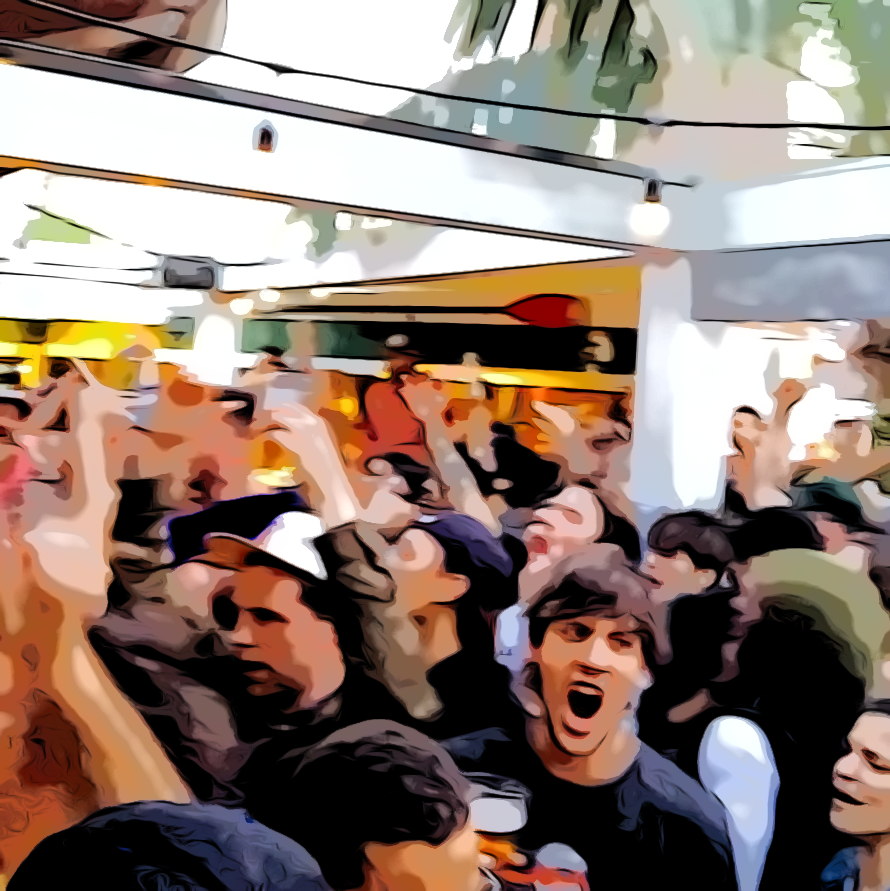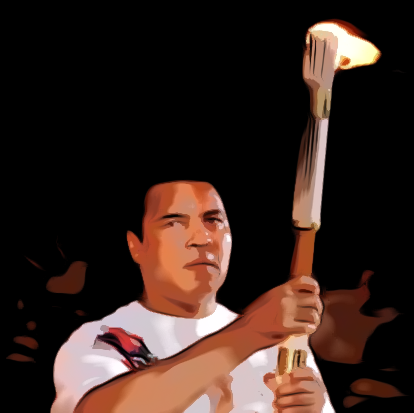You Got Curtains In This Thing, Baby?
When Gerald first saw her, he quickly clocked her as one of the Top 5 best looking girls at the party. Not #1, but not #6 either. She was noted. 15 minutes later—or one beer, whichever came first—she was walking past him on her way to the kitchen, and he cooly, casually broke from his conversation to say hello, then cooly, casually resumed. He was noted.
***
“Ahh, that was so long ago! Like 25 years!” Gerald says to me and thrusts into a belly laugh. We’re standing in his driveway, and he’s telling me this story while he’s painting a sugar-sweet red BBQ sauce on a few slabs of ribs, a pile of wings and a row of sausages smoking on his grill. He works odd-hour shifts for MUNI, the Bay Area municipal transit authority, which I only know because some early mornings, as I’m dragging out the dog for our constitutional, I see him coming home and climbing his porch stairs in his brown-on-brown uniform, his lanyard badge swinging from his neck. But I have no idea what he does because we don’t ever talk about work. Actually, when we meet up, I don’t really say much at all. I listen while Gerald pontificates. About the Warriors. About the Raiders. About Oakland’s past and present glories. Gerald’s dad was one of the original members of the Black Panthers, and before the group set up their official headquarters around the corner from us, at what is now the It’s All Good Bakery, Gerald says they would hold meetings in his house—this house…this way-faded yellow bungalow with paint-chipped railings and scrubby grass in the front yard.
***
The girl’s boyfriend showed up to the party in a rageful rush and immediately dialed in on her. Some harsh words, a shove. Even a slap. The boyfriend snatched her keys out of her hand and left. She crumpled onto the sofa in tears. Gerald had eyed the fight. Everybody did. He waited a few minutes and then cooly, casually walked over to her. “Hey,” said Gerald. “Are you okay? If you need anything, you let me know.” She didn’t look up but nodded into her hands.
***
“I grew up playing in all these houses,” says Gerald. “Yours. Greg’s just a few doors down. There was a whole gang of us kids here on 56th Street. Greg taught me how to hustle. We’d buy cheap-ass mint cookies at the market around the corner then walk up to Berkeley and sell them to those dumb-ass kids for like 50 cents a piece. Made a fortune. I was with Greg one day when I was about 12, and all of a sudden, there’s this commotion just down the street there. This gang of people walking down the sidewalk. And we ran over to see what was going on, and goddammit it if it wasn’t Muhammad Ali! Just strolling. He was on his way to an exhibition at the school right down the street there, St. Mary’s. And so me and Greg and all these other kids go running up, and we’re yelling “Ali! Ali!” and he stops and shakes our hands. My hand. I had it out higher than everybody there, and he reaches down and shakes it.”
***
The party was pretty much done. It was like 1:30 a.m., maybe later. Gerald started saying his goodbyes and left through the front door, only when he went to close it shut, there was resistance, like somebody was holding it on the other side. It was her. “Did you mean it when you said you would help if I needed anything?” she asked.
Of course.
“Can you give me a ride back to my apartment?”
Of course.
***
“I was in San Francisco the other night when I heard that Ali was gone,” says Gerald. “And I ain’t ashamed to say that I started crying a little bit. He was everything for us. The Champ was everything. You feel what I’m saying?”
***
Gerald had driven his old beat-up Volkswagen Westfalia camper to the party, and she laughed a little when she stepped up into the front seat. He started faking offense, joking that if she didn’t like his ride then she could walk her ass home, which made her laugh harder. When they pulled up to her apartment building she got serious again. The window in her bottom-floor front room was open, and she saw her boyfriend. He was pacing, holding the rotary phone base in one hand, the receiver pushed to his ear. And he was yelling all loud—probably to one of his friends—and he was cussing about her to whoever was on the other end of the line. Calling her names. Bad names.
Sitting there in the passenger seat, she threw her face in her hands again and started sobbing. Again. And it was late, and Gerald was pretty drunk and quiet, but he was still eyeing her. I mean, what could he do except just let her do what she needed to do. And all of a sudden, the sobbing stopped. Cold. And he could feel her shift from sad to mad. And she raised her head, sniffed in hard, breathed out slow and looked at Gerald. Then she started scanning the camper—the ceiling, the seats and the back with its pads and blankets.
And with this mischievous, vengeful smirk she says, “You got curtains in this thing, baby?”
Of course.
Originally published as "Curtains" by Tanner Latham







